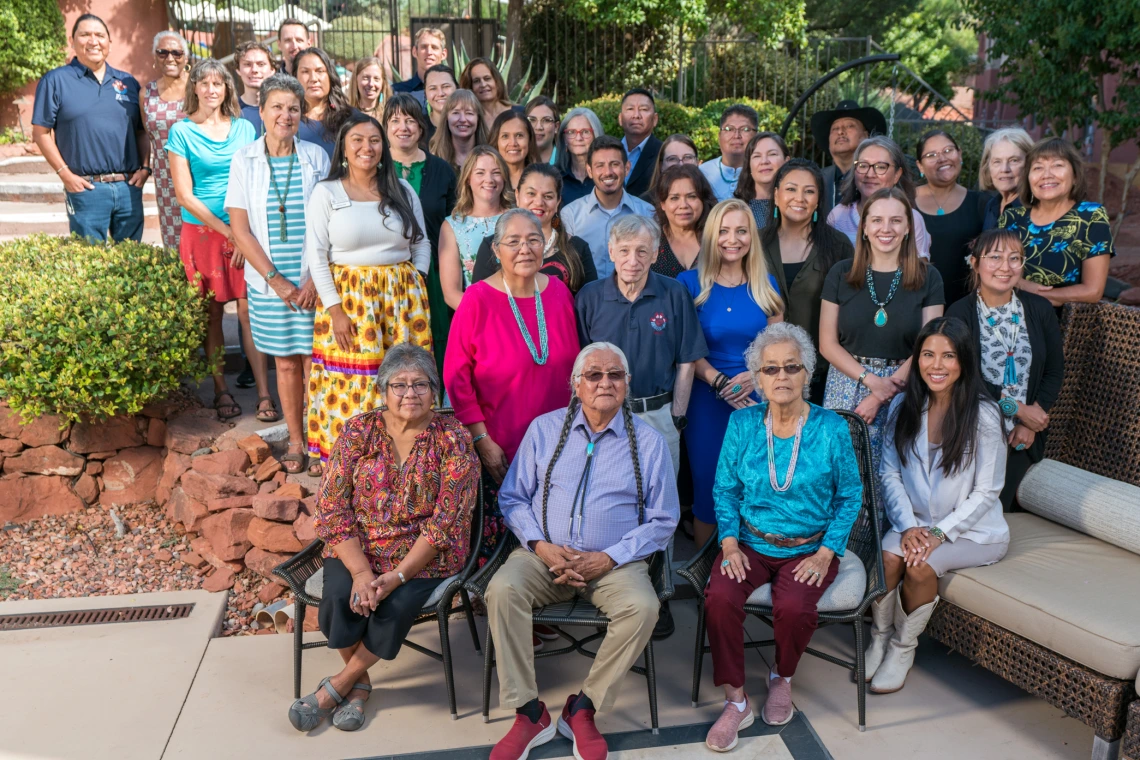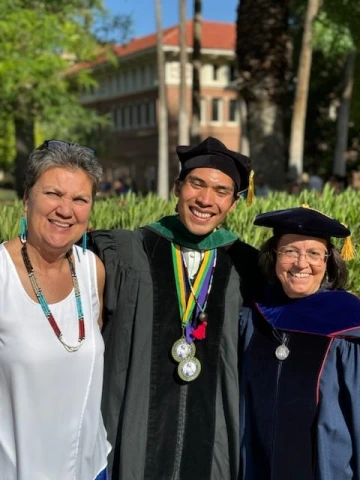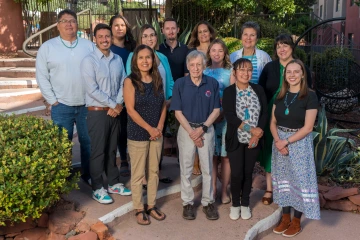Celebrating the prolific work of the Partnership for Native American Cancer Prevention

NACP thrives at reducing cancer burden, increasing health equity and expanding Native American investigator numbers
More than 20 years ago, researchers from the University of Arizona Cancer Center and Northern Arizona University joined forces to build a dream program for Native Americans—one that reduces their cancer burden, increases cancer health equity and expands the number of Native American cancer investigators through research and community engagement.
Originally named the Native American Cancer Research Partnership and later renamed as the Partnership for Native American Cancer Prevention, their program has been growing since 2002 under continuous funding by the National Cancer Institute’s Comprehensive Partnerships to Advance Cancer Health Equity.
Yet, despite the program’s inroads, American Indian and Alaska Native students are still the single most underrepresented racial group in population size in the biomedical and health sciences, according to a recent publication from NACP researchers. NACP’s work defies this statistic, having invested in 367 Native American trainees, while 237 students earned 341 degrees during the program’s existence. They reached trainees from 45 tribal nations, including 12 of the 22 federally recognized tribes in Arizona and at least 33 other tribal nations beyond Arizona.
“I'm old enough to remember when we could count on maybe two hands the number of native researchers that we had, and just to know that that number has really grown is exciting,” said Francine C. Gachupin, PhD, MPH, professor in the University of Arizona College of Medicine – Tucson, Department of Family and Community Medicine. “To know that we have a program that has contributed in some way to the success and the ability of these Native American researchers to do their work validates why we have a program like NACP.”
Now for the first time, both NACP principal investigators are also Native American: Gachupin, who is a tribal member of the Pueblo of Jemez in New Mexico and Regents Professor Jani Ingram, who is Diné, commonly known as Navajo, in analytical and environmental chemistry at NAU.
“I think a large bulk of the credit goes to the National Cancer Institute for making this mechanism available over time,” Gachupin said. “I think NACP demonstrates that you really do need to have continued support to see outcomes that take a lot longer than you would think. NACP is now in our 20th year, and that's how long it's taken for us to see our students matriculate from an undergraduate level to an early-stage investigator level.”
Gachupin said that working together while in Tucson and Flagstaff, more than 250 miles apart, requires a strong team with extraordinary communication skills.
“We are in constant communication to make sure that we're all on the same page with any major decisions,” Gachupin said. “We are a big team, yet we respect each other's experiences and expertise and make sure we gather everybody's input to optimize the direction of NACP.”
Changing cancer outcomes for Native Americans
Gachupin said that cancer health disparities are very real for Native American people. They are diagnosed at much later stages, their five-year cancer survival rate is not as positive, and they tend to get diagnosed at much younger ages.
“Through different publications and all that we're learning, we're hoping that we give credence to these disparities as we make recommendations for addressing them,” Gachupin said.
Ingram said that it is critical for NACP to work in partnership with the Native American communities to understand their concerns and develop projects and programs together with those communities so they can be successful.
“Our Native American communities have unique characteristics, so approaches that may work for other communities may not necessarily work for the communities we serve,” Ingram said.
Training researchers
NACP also works with research teams who are new to working with tribal communities.
“Doing research with tribal communities is very different than doing research with any other community because tribes are sovereign, meaning that they set their own rules and regulations for how things are to happen,” Gachupin said. “Many investigators have never encountered that the tribes own the data. They have always worked in an institution where the institution owns the data, and so it's a very different dynamic.”
Gachupin said that training researchers in how to conduct research with a nation that sets its own parameters, called memorandums of understanding, requires a steep learning curve for many investigators. NACP invests in long-term training of research teams. As their work grows based on their experience working with communities, they learn to modify and adapt their research to benefit nations.
“These projects really do allow us to help mentor these research teams to understand what it means to do respectful, transparent, beneficial research with tribal communities,” Gachupin said.
Training students
In 2021, the National Science Foundation ranked the University of Arizona first nationally for doctoral degrees awarded to Native Americans. NACP leaders believe that building a successful environment for Native American students starts with a personal invitation through networking, institutional databases and instructor referrals.
“Many of these students are away from home for their first time. They don't know anyone, and they don't know the systems. Everything's so expensive, and so it really is very intimidating,” Gachupin said. “Just knowing that somebody cares about them makes all the difference. And we have an extraordinarily strong referral network at both NAU and U of A.”
Gachupin said that the University of Arizona has a Native American Student Association, and in health sciences, there are programs specific to nursing, pharmacy, medical and public health students.

“There are these social networks so they can be part of a group that has commonalities, that they can not only study with, but also do things together with, and so we try to get them in touch with these different resources, including financial aid and housing,” Gachupin said. “We work very closely with a lot of these resources to make sure that students aren't falling through the cracks.”
Tyrel Terrill Yazzie, a Navajo student, who graduated with his master’s from the University of Arizona, participated in the Postbaccalaureate Research Education Program called PREP@UAZ.
“I think NACP is important because of the resources and community support it provides to Native American students,” he said. “My mentor, Dr. Ronald Heimark, assisted me with advice on what educational opportunities to consider and helped me gain skills within the laboratory. Dr. Margaret Briehl, Dr. Dirk De Heer, NACP NAU Research Education core lead, and Jennifer Daw, Navajo, NACP pre-doctoral student, assisted me with advice and support, which helped me navigate throughout the semester.”
Developing early-stage health care leaders
To continue to guide their careers after graduation, NACP has a resource called GUIDeS, which stands for Guiding U54 Investigator Development to Sustainability for investigators and junior investigators.
In GUIDeS, investigators are mentored through a rigorous process of designing a cancer research project and identifying potential funding opportunities. They participate in grant development workshops, mentorship, biostatistics support services, and training in time management and research communication skills.

Postdoctoral researcher Nicole Jimenez, PhD, BIO5 Institute postdoctoral research associate in the Herbs-Kralovetz lab and department of obstetrics and gynecology, said her mentor and principal investigator suggested she meet with the GUIDeS group who would support her aspirations to pursue cancer research with a focus on health equity.
“My participation in writing accountability groups and GUIDeS has been invaluable to my career development but also fosters building lasting relationships with research and community members who have similar research and societal interests,” Jimenez said.
Melissa Herbst-Kralovetz, PhD, professor of basic medical sciences in the University of Arizona College of Medicine – Phoenix and director of the Translational Women’s Health Research Program on the medical campus, is also one of the multiple principal investigators of NACP from the Cancer Center.
“Dr. Herbst-Kralovetz has been instrumental in my career development during my postdoctoral training,” Jimenez said. “I have also had close collaborative relationships with Drs. Naomi Lee and Greg Caporaso at Northern Arizona University and Dr. David Garcia at University of Arizona – Tucson. Being mentored by different faculty from other Arizona institutions has been enlightening as I begin the next phase of my academic career.”
Early-stage health care leader Jennifer Erdrich, MD, MPH, Turtle Mountain Chippewa, is one of five Native American oncologists in the United States, and a surgeon with ties to NACP. Last year, Erdrich was awarded a $1.3 million Mentored Clinical Scientist Research Career Development Award from the National Cancer Institute to study the effectiveness of lifestyle interventions in Native American patients with obesity-related solid tumor cancers who are preparing for surgery.
Erdrich is a U of A Cancer Center member, assistant professor in the U of A College of Medicine – Tucson Department of Surgery and surgical oncologist in the Division of General Surgery who specializes in melanoma, sarcoma, and breast cancers. She also provides general surgical oncology care to tribal populations throughout Southern Arizona.
“When she's doing her clinical practice, she's doing surgery on cancer, but then in her research time, she's working out in tribal communities, starting research projects trying to promote a healthy lifestyle—to really prevent risk for cancer and other chronic diseases,” Gachupin said.
Another important early-stage leader is Jonathan Credo, MD, PhD, Navajo, who was mentored through NACP for 14 years and attended both NAU and the University of Arizona. He is in his post-graduate year in internal medicine and psychiatry residency at the University of California, Davis School of Medicine.
Gachupin said that Credo is interested in environmental exposures to cancer risks and is a provider who takes time to work in the field or in a community to address NACP’s topic areas for Native Americans.
“I think NACP is important because it provides an opportunity for Native American and Alaska Native students to excel and be exposed to opportunities that they otherwise probably would not have,” Credo said. “Not only that, NACP provides support and environment that allows students to grow as well as a safe space. NACP and Dr. Ingram quite literally gave me the opportunity of a lifetime and gave me my life.”
Ryan Stiffarm, a San Carlos Apache student who was an undergraduate and received his Master of Science degree at the University of Arizona, was recently admitted to University of Arizona College of Medicine -– Tucson Medical School to become a physician. He started with NACP four years ago.
“I think it is important to expose Indigenous students to lab bench research, especially when that research topic directly affects those students and their families,” Stiffarm said. “My mentor, Dr. Ron Heimark, NACP U of A GUIDeS core lead, led me through lab protocols step-by-step. He also gave me confidence to know that I could run these experiments independently. Dr. Jennifer Bea, NACP U of A Research Education core lead and Dr. Margaret Briehl, former NACP U of A contact multiple principal investigator, also held weekly sessions with NACP students for professional development and to learn more about how specific cancers affect Indigenous populations. They were all integral in my journey.”
Developing subsequent leaders
For the NACP leadership team, strategically discovering leadership successors and mentoring them into these leadership roles is another key to success.
“We call it shadowing,” Gachupin said. “We're identifying people who are going to take over some of these leadership roles in the future. That allows them to really learn and to be in a safe space where what they're contributing is valued, but they don't have the pressure of being the voice that's going to speak on the issue.”
Ingram said that mentorship is critical for folks at all levels. She spends many hours working with NACP students, staff and faculty.
“I was mentored through NACP in research, student activities and leadership which was so very helpful for my development as a leader for NACP,” said Ingram. “It is wonderful to have mentors that are available to help you throughout your career—not just for a short amount of time.”
In 2012, Bea, PhD, Cancer Prevention and Control Program co-leader, and Shared Resources director, Behavioral Measurement and Interventions, associate professor in Health Promotion Sciences, started at NACP by working on a pilot program in collaboration with de Heer, PhD, MPH, associate professor in the NAU Department of Physical Therapy and Athletic Training.
“Working with NACP provided me with a large number of faculty mentors and community advisers across the state,” Bea said. “I specifically wanted to develop greater cultural competency and wrote it into my career development plan.”
Bea said that NACP provided room for her to grow into community-engaged research when her background was in bench work and clinical research.
“I gained a deep appreciation for cancer health disparities and continue to work in that vein today,” Bea said. “It also sparked a passion for diversifying the workforce to enable higher quality and culturally relevant care and research in our underserved communities.”
The NACP team submitted a competitive renewal and are awaiting word on continued funding. All are hopeful that NCI will continue to invest in this important and impactful program. The team said they are appreciative of the ongoing institutional support received from both U of A and NAU over the years.

